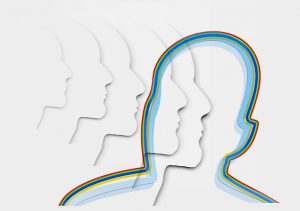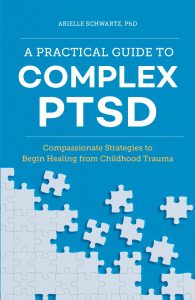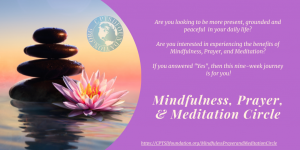No one is harder on a survivor of complex trauma than the survivor. Survivors feel they are a burden, be unable to have a voice for themselves, or feel shame. Also, survivors often lack trust in who they are and believe no one is trustworthy.
This article will focus on self-compassion and how relational trauma causes harm, especially when you are affected by complex post-traumatic stress disorder (CPTSD).
Unresolved Relational Trauma Harms Self-Compassion
 Self-compassion can be described as caring for oneself by acknowledging and respecting one’s emotional needs. Because of complex trauma, survivors do not understand how to practice self-compassion and learn how to nurture, love, and respect themselves.
Self-compassion can be described as caring for oneself by acknowledging and respecting one’s emotional needs. Because of complex trauma, survivors do not understand how to practice self-compassion and learn how to nurture, love, and respect themselves.
A type of trauma you may not have heard much about is relational trauma. Relational trauma happens when a child’s sense of safety and love from their family is constantly disrupted. This type of trauma occurs in childhood when the bonding between a child and their parent is disrupted. This interruption has grave consequences for the child because the bond between parent and child is essential in shaping who they will become as they grow and form new relationships outside the home.
A broken bond between parents and child also impacts how the child sees and treats themself. With unresolved relational trauma comes self-critical thoughts and intolerance of our mistakes. We may even engage in self-harming behaviors, such as suicidal thoughts or actions.
Folks who grew up in a dysfunctional home where the bond was interrupted also are plagued with critical thoughts about themselves and feeling intolerant of their mistakes. Those living with a wounded soul due to relational trauma and the trauma bond they have developed with those around them have difficulty showing themselves self-compassion.
The Cornerstones of Self-Compassion
Compassion can be translated as “feel moved by” or “feel with” someone else’s experience. Typically, compassion forms in response to someone else’s suffering that evokes in us a desire to understand why they are hurting and a need to offer them help and kindness.
You deserve the same intentional warmth and care you would offer someone else. Recovery from trauma involves creating positive coping strategies and focusing your attention on your strengths. Self-compassion aids in healing by offering yourself the support and love you deserve.
If the survivor ignores their need for self-compassion, they are missing out on the power it can bring and gain a lot of problems with their self-esteem. The cornerstone of healing from complex trauma, self-compassion, has three components: common humanity, self-kindness, and mindfulness.
Common humanity. It is vital to recognize that suffering and pain are universal.
Self-kindness. It is critical to learn to become warm towards oneself when experiencing emotional pain. Self-kindness means we do not hurt ourselves through self-criticism.
Mindfulness. This component aids survivors by taking a balanced approach to negative emotions and helps avoid suppressing them. Using non-judgmental mindfulness, one can observe our thoughts and feelings without denying them. Mindfulness requires that we do not overidentify with any emotional thought patterns that cause adverse reactions because it ends ruminations on those thoughts.
The Two Actions that Will Increase Self-Compassion

According to Dr. Arielle Schwartz, “Self-compassion involves two key actions. First, we must set limits for ourselves to reduce habitual negative thoughts and behaviors that perpetuate harm. Second, we must repeatedly practice new kind and loving thoughts and behaviors. Self-compassion becomes easier and more accessible when we revisit this practice regularly.”
Let us examine deeper the six actions that will increase self-compassion.
Set Limits for Yourself. Many who grew up in dysfunctional settings and now need to show self-compassion to heal from childhood maltreatment, become people-pleasers and have an inner critic that works against them. By setting simple limits for themselves, survivors can overcome the critical things they think and say about themselves and find self-compassion.
The limits one should set for oneself are as follows.
- Ask for support
- Watch out for self-sacrificing behaviors
- Permit yourself to say “NO.”
- Do loving-kindness meditation
- Practice tuning into your emotions
Ask for support. Learn how to reach out to someone else if you feel uncomfortable with your newfound self-compassion. You do not need to struggle alone, as most people you meet are friendly and want to help. Seek professional mental health help if you are overwhelmed by negative thoughts and feelings while learning to be compassionate to yourself. You deserve to be treated with kindness and love.
Watch out for self-sacrificing behaviors. You must set firm protective boundaries to keep you safe from people-pleasing behaviors. Remember that you are worthwhile and what you think and feel is vital. Practice not allowing other people to use you; instead, take good care of yourself.
Permit yourself to say “NO.” No is the most powerful word in the English language. You can refuse to put others ahead of your needs with the word no. It is critical to say no when your needs have not been met, when others would have you sacrifice yourself for them. Just say no.
Do Loving-Kindness Meditation. You may think you haven’t the time to meditate because, in your mind, it involves sitting in a strange position and repeating a sound while thinking. However, meditation is much more than that; it involves simply thinking deeply about yourself and what you want from life. By spending time with yourself in meditation, you can quiet the inner critic by employing positive reinforcements and visualizations of who you want to be.
Practice Tuning Into Your Emotions. People who have survived childhood maltreatment sometimes have become separated from their emotions because they had to if they were to survive. It is critical to tune back into your emotions by recognizing and appropriately expressing them with a friend or mental health professional. Only when you learn to tap into your emotions, do you truly heal.
You will become more self-assured and increase self-love by following these five limits.
Ending Our Time Together
 If you wish to defeat the effects of complex post-traumatic stress disorder in your life, you must first overcome your inner critic and learn self-compassion. You can do many things to help you love yourself, such as the six limits mentioned above and many more that were not covered in this piece.
If you wish to defeat the effects of complex post-traumatic stress disorder in your life, you must first overcome your inner critic and learn self-compassion. You can do many things to help you love yourself, such as the six limits mentioned above and many more that were not covered in this piece.
Self-love is vital in healing from complex and relational trauma. One cannot go around, under, or above the past trauma; one must pass through and be reborn on the other side.
Self-compassion can aid you in completing your journey to peace and self-acceptance.
“The worst loneliness is to not be comfortable with yourself.” – Mark Twain
“You can search throughout the entire universe for someone who is more deserving of your love and affection than you are yourself, and that person is not to be found anywhere. You, yourself, as much as anybody in the entire universe, deserve your love and affection.” – Sharon Salzberg

Are you a therapist who treats CPTSD? Please consider dropping us a line to add you to our growing list of providers. You would get aid in finding clients and help someone find the peace they deserve. Go to the contact us page and send a note, and our staff will respond quickly.
Shortly, CPTSD Foundation will have compiled a list of providers treating complex post-traumatic stress disorder. When it becomes available, we will put it on our website www.CPTSDFoundation.org.
Visit us and sign up for our weekly newsletter to help inform you about treatment options and much more for complex post-traumatic stress disorder.
If you or a loved one live in the despair and isolation of complex post-traumatic stress disorder, please come to us for help. CPTSD Foundation offers a wide range of services, including:
- Daily Calls
- The Healing Book Club
- Support Groups
- Our Blog
- The Trauma-Informed Newsletter
- Daily Encouragement Texts
All our services are reasonably priced, and some are even free. So, sign-up to gain more insight into how complex post-traumatic stress disorder is altering your life and how you can overcome it; we will be glad to help you. If you cannot afford to pay, go to www.cptsdfoundation.org/scholarship to apply for aid. We only wish to serve you.
The Healing Book Club

As of May 7th, 2022, the current book will be – “A Practical Guide to Complex PTSD: Compassionate Strategies to Begin Healing from Childhood Trauma.”
by Dr. Arielle Schwartz.
Here is an Excerpt –
Repetitive trauma during childhood can impact your emotional development, creating a ripple effect that carries into adulthood. Complex post-traumatic stress disorder (C-PTSD) is a physical and psychological response to these repeated traumatic events. A Practical Guide to Complex PTSD contains research-based strategies, tools, and support for individuals working to heal from their childhood trauma. You don’t have to be a prisoner of your past.
Learn the skills necessary to improve your physical and mental health with practical strategies taken from the most effective therapeutic methods, including cognitive-behavioral therapy (CBT), dialectical behavioral therapy (DBT), eye movement desensitization, and reprocessing (EMDR), and somatic psychology. When appropriately addressed, the wounds of your past no longer need to interfere with your ability to live a meaningful and satisfying life.
This book includes:
- Understand C-PTSD—Get an in-depth explanation of complex PTSD, including its symptoms, its treatment through various therapies, and more.
- Address the symptoms—Discover evidence-based strategies for healing the symptoms of complex PTSD, like avoidance, depression, emotional dysregulation, and hopelessness.
- Real stories—Relate to others’ experiences with complex PTSD with multiple real-life examples in each chapter.
Start letting go of the pain from your past—A Practical Guide to Complex PTSD can help show you how.
Mindfulness, Prayer, and Meditation Circle
 Meditation can be an integral part of healing from trauma. Our 9-week self-study video course helps you integrate this fantastic grounding, centering, and focus method. Join the Mindfulness, Prayer, and Meditation Circle today!
Meditation can be an integral part of healing from trauma. Our 9-week self-study video course helps you integrate this fantastic grounding, centering, and focus method. Join the Mindfulness, Prayer, and Meditation Circle today!

A new Trauma-Informed Yoga program is coming in the Summer of 2022! Check out our information page about this highly requested new program! #yoga #traumainformed #cptsd #mentalhealth #recovery #wellness https://cptsdfoundation.org/traumainformedyoga/

My name is Shirley Davis and I am a freelance writer with over 40-years- experience writing short stories and poetry. Living as I do among the corn and bean fields of Illinois (USA), working from home using the Internet has become the best way to communicate with the world. My interests are wide and varied. I love any kind of science and read several research papers per week to satisfy my curiosity. I have earned an Associate Degree in Psychology and enjoy writing books on the subjects that most interest me.





Another useful resource is The Sophie Code by Kiai Ra, she too is a survivor.
Her ability, intended or otherwise, weaves together Wittgenstein, Jung and Kristeva and in a way that makes Jasper’s incomplete.
The work falls into the genre of New Age but really deserves a much more considered and thoughtful reading.